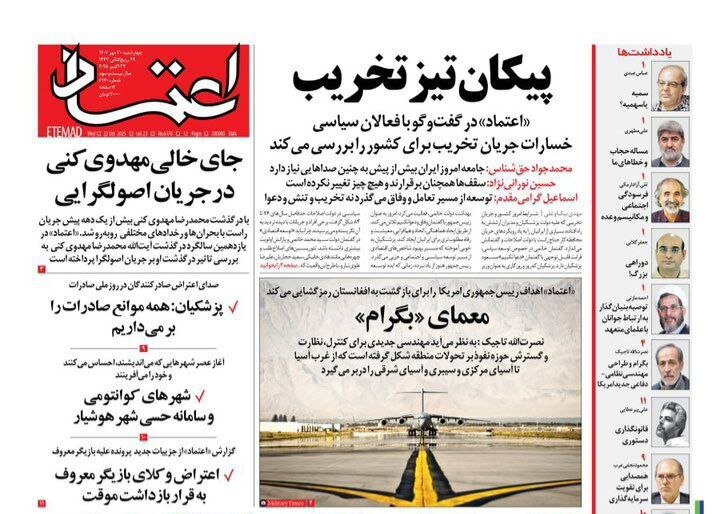A Strong economy is key to navigating sanctions

TEHRAN - In a recent article, Etemad addressed the ongoing sanctions against Iran and the challenges of overcoming them.
October 18, 2025, marked the final day of implementing UN Security Council Resolution 2231. While some countries supported Iran’s call to lift sanctions, the reality suggests that their shadow continues to loom over the nation. The reactivation of sanctions through the snapback mechanism—initiated by the E3—served as a final blow, underscoring that the issue remains unresolved. Iran currently faces three layers of sanctions: those imposed by the United Nations, reinstated via the snapback mechanism, unilateral sanctions from the United States, and additional restrictions from the European Union and the United Kingdom. Sanctions have become strong instruments for obstructing a nation’s path to development and isolating it from the global community. Confronting these pressures demands more than resilience; it requires strong crisis management and a stable economic foundation. Only through sound governance and strategic planning can Iran mitigate the impact of sanctions, safeguard its currency, and prevent economic collapse.
Ham Mihan: The strategic impact of Chinese and Russian support for Iran
In an interview with international affairs analyst Hassan Beheshtipour, Ham Mihan explored the role of Chinese and Russian support in countering sanctions against Iran. Beheshtipour described the international consensus on reinstating sanctions as one of the most fragile alignments the global community has seen in recent years. Russia has made its position clear: it not only rejects the renewed resolutions but considers them expired. Consequently, Moscow does not view itself as obligated to enforce them. China has also expressed opposition, though it has yet to officially declare non-compliance. Nevertheless, indications suggest that Beijing is unlikely to implement the sanctions in practice. Iran, according to Beheshtipour, can partially manage the situation by engaging diplomatically with countries to discourage enforcement. In this context, relations with neighboring states such as Turkey and the UAE—both of which have aligned with the implementation of the resolutions—require careful attention. Ultimately, the analyst emphasized that domestic economic reform is essential. Strengthening Iran’s internal economic structure is a critical step toward reducing the impact of external sanctions and enhancing national resilience.
Iran: The 14th government’s active economic diplomacy
Iran has highlighted the strategic orientation of Iran’s 14th government toward active economic diplomacy, both regionally and globally. The newspaper argues that this approach is increasingly visible in the evolving landscape of regional economic cooperation. One notable example is Iran’s engagement with Turkey, where trade and economic policymaking have been intelligently aligned with neighborhood dynamics. This synergy has produced tangible outcomes, not only in export and import figures but also in Iran’s broader economic bargaining power and management of foreign exchange resources. The experience underscores a critical insight: while distant markets may offer allure, they cannot substitute the potential of neighboring economies. Iran’s recent outreach to African nations further illustrates this shift. Following a specialized trade exhibition, the volume of Iran’s commerce with the continent has more than doubled. This surge signals Africa’s potential to become a major economic partner, provided that Iran pursues long-term, strategically grounded economic diplomacy and trade planning.
Khorasan: Poland’s alignment with Western pressure
Khorasan examined recent remarks by the Polish Foreign Minister during a meeting at the London Parliament, in which he alleged that drones used by Russia in attacks on Polish territory were manufactured in Iran. According to Polish officials, these claims appear to reflect internal political pressures within NATO and the European Union rather than verified intelligence. In recent years, Warsaw has positioned itself as the “front line of Western security,” often amplifying perceived threats from Russia and Iran. Analysts suggest that the drone allegation is part of a broader pattern of orchestrated Iranophobia, employed by certain Western actors as a tool of political leverage. Ultimately, Khorasan argues that Poland’s decision to align with anti-Iran narratives may yield short-term diplomatic favor among Western allies, but risks long-term damage to its international credibility and the historically cordial relations between Poland and Iran.
Leave a Comment